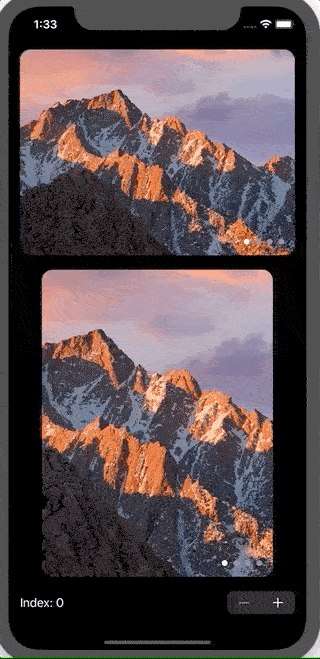There is no built-in method for this in SwiftUI this year. I'm sure a system-standard implementation will come along in the future.
In the short term, you have two options. As Asperi noted, Apple's own tutorials have a section on wrapping the PageViewController from UIKit for use in SwiftUI (see Interfacing with UIKit).
The second option is to roll your own. It's entirely possible to make something similar in SwiftUI. Here's a proof of concept, where the index can be changed by swipe or by binding:
struct PagingView<Content>: View where Content: View {
@Binding var index: Int
let maxIndex: Int
let content: () -> Content
@State private var offset = CGFloat.zero
@State private var dragging = false
init(index: Binding<Int>, maxIndex: Int, @ViewBuilder content: @escaping () -> Content) {
self._index = index
self.maxIndex = maxIndex
self.content = content
}
var body: some View {
ZStack(alignment: .bottomTrailing) {
GeometryReader { geometry in
ScrollView(.horizontal, showsIndicators: false) {
HStack(spacing: 0) {
self.content()
.frame(width: geometry.size.width, height: geometry.size.height)
.clipped()
}
}
.content.offset(x: self.offset(in: geometry), y: 0)
.frame(width: geometry.size.width, alignment: .leading)
.gesture(
DragGesture().onChanged { value in
self.dragging = true
self.offset = -CGFloat(self.index) * geometry.size.width + value.translation.width
}
.onEnded { value in
let predictedEndOffset = -CGFloat(self.index) * geometry.size.width + value.predictedEndTranslation.width
let predictedIndex = Int(round(predictedEndOffset / -geometry.size.width))
self.index = self.clampedIndex(from: predictedIndex)
withAnimation(.easeOut) {
self.dragging = false
}
}
)
}
.clipped()
PageControl(index: $index, maxIndex: maxIndex)
}
}
func offset(in geometry: GeometryProxy) -> CGFloat {
if self.dragging {
return max(min(self.offset, 0), -CGFloat(self.maxIndex) * geometry.size.width)
} else {
return -CGFloat(self.index) * geometry.size.width
}
}
func clampedIndex(from predictedIndex: Int) -> Int {
let newIndex = min(max(predictedIndex, self.index - 1), self.index + 1)
guard newIndex >= 0 else { return 0 }
guard newIndex <= maxIndex else { return maxIndex }
return newIndex
}
}
struct PageControl: View {
@Binding var index: Int
let maxIndex: Int
var body: some View {
HStack(spacing: 8) {
ForEach(0...maxIndex, id: .self) { index in
Circle()
.fill(index == self.index ? Color.white : Color.gray)
.frame(width: 8, height: 8)
}
}
.padding(15)
}
}
and a demo
struct ContentView: View {
@State var index = 0
var images = ["10-12", "10-13", "10-14", "10-15"]
var body: some View {
VStack(spacing: 20) {
PagingView(index: $index.animation(), maxIndex: images.count - 1) {
ForEach(self.images, id: .self) { imageName in
Image(imageName)
.resizable()
.scaledToFill()
}
}
.aspectRatio(4/3, contentMode: .fit)
.clipShape(RoundedRectangle(cornerRadius: 15))
PagingView(index: $index.animation(), maxIndex: images.count - 1) {
ForEach(self.images, id: .self) { imageName in
Image(imageName)
.resizable()
.scaledToFill()
}
}
.aspectRatio(3/4, contentMode: .fit)
.clipShape(RoundedRectangle(cornerRadius: 15))
Stepper("Index: (index)", value: $index.animation(.easeInOut), in: 0...images.count-1)
.font(Font.body.monospacedDigit())
}
.padding()
}
}

Two notes:
- The GIF animation does a really poor job of showing how smooth the animation is, as I had to drop the framerate and compress heavily due to file size limits. It looks great on simulator or a real device
- The drag gesture in the simulator feels clunky, but it works really well on a physical device.
与恶龙缠斗过久,自身亦成为恶龙;凝视深渊过久,深渊将回以凝视…
